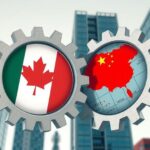U.S. White House Critiques India’s Trade Barriers and Announces Tariffs
The White House criticized India’s stringent certification requirements affecting U.S. exports, which complicate market entry for American companies. In response, President Trump announced a 26 percent reciprocal tariff on India amid broader efforts to level trade disparities. The initiative is aimed at protecting American industries and reclaiming competitiveness in the global market.
The White House has expressed concerns regarding India’s “uniquely burdensome” testing and certification requirements affecting sectors such as chemicals, telecommunications, and medical devices. These barriers reportedly complicate and increase costs for American companies attempting to enter the Indian market. Removing such obstacles could enhance U.S. exports by an estimated USD 5.3 billion annually.
During an announcement concerning new tariffs, President Donald Trump highlighted India’s 52 percent tariffs on U.S. imports, which he described as excessively high. In response, he introduced a “discounted reciprocal tariff” of 26 percent on goods from India, calling for equitable trade practices. His administration seeks to address these disparities while supporting American workers and manufacturers, denouncing long-standing foreign trade practices that have disadvantaged the United States.
The White House fact sheet emphasizes that many nations impose higher tariffs on U.S. goods compared to the relatively low average tariff rate of 3.3 percent in the U.S. Officials pointed out that countries such as India and the European Union impose significantly higher tariffs on various products. This discrepancy has raised concerns about American competitiveness in the global market.
Notably, the fact sheet criticized China’s non-market policies, asserting they have facilitated China’s dominance in essential manufacturing sectors, contributing to significant job loss in the U.S. Since 2001, such practices are estimated to have displaced 3.7 million American jobs by escalating trade deficits, thereby threatening national economic security.
During his address from the Rose Garden, President Trump underscored the tariffs imposed by multiple nations and their impact on U.S. products. He vehemently criticized the longstanding unfair trade practices that have harmed American industries, and he referred to the announcement of reciprocal tariffs as significant in reclaiming America’s economic potential.
On April 2, 2025, Mr. Trump proclaimed this date as “Liberation Day,” marking the implementation of these tariffs as the revitalization of American industry. He reiterated that the new tariffs would be reciprocal, indicating a straightforward approach to addressing trade imbalances and fostering fair competition.
In summary, the White House has identified India’s stringent certification requirements as a barrier that hinders American businesses, advocating for change that could notably enhance U.S. export capabilities. President Trump’s newly announced reciprocal tariffs aim to rectify unfair trade imbalances, bolster U.S. industries, and signal a robust response to excessive foreign tariffs. This initiative is positioned as a critical step toward re-establishing America’s competitive edge in global trade.
Original Source: www.thehindu.com








Post Comment